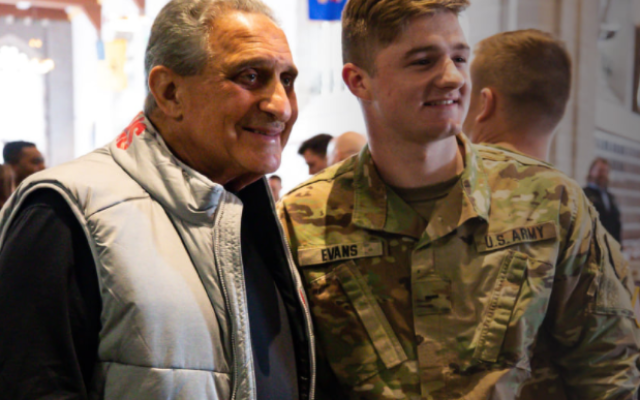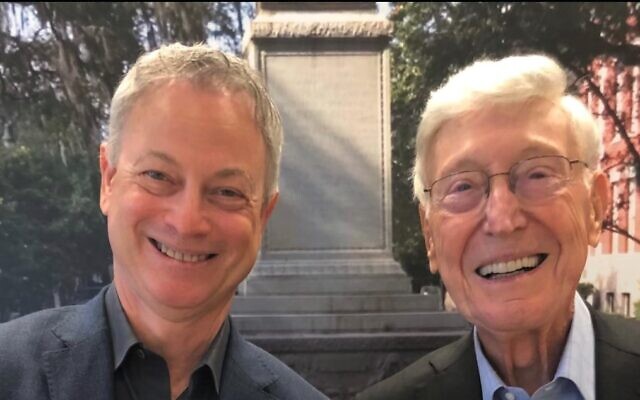Marcus and Blank Foundations Aid Veterans with PTSD
The $40 million dollar initiative announced last year has maintained its momentum despite the effects of the COVID pandemic.
A year after Bernie Marcus and Arthur Blank came together for their most ambitious joint philanthropic venture in years, their project to aid military veterans with PTSD is on target for a rapid expansion.
The $40 million project, announced last February, will help veterans with related physical and neurological injuries. It has been a personal project for Marcus, who served in the Air National Guard for four years and whose older brother fought in the Battle of the Bulge during World War II.
“If we properly heal and transition our veterans,” he said, “we’ll heal our nation.”
Marcus Ruzek, a senior program director at the Atlanta-based Marcus Foundation, said that the additional support came at a time when the program was in danger of slowing due to the impact of the COVID pandemic. Hospitals curtailed much of their traditional case load and Ruzek feared that the program’s momentum would stall.
“Because of COVID, we were able to adapt as best we could by doing some things virtual. But having the financial runway from Bernie and from Arthur really allowed the network to continue to grow and evolve, whereas had we not had that backing, it wouldn’t have happened.”
Ruzek, who served as a captain in the Army’s Special Forces (Green Beret) before coming to the Marcus Foundation in 2014, underscores how crucial treatment like this has been for fellow service members who often give up hope of dealing with service-related psychological trauma.

“Veteran suicide is an epidemic in this country, and that’s really always been what has driven this program. We have between 20 and 30 veterans committing suicide every day in this country. There’s been a 33 percent rise in that rate since the COVID pandemic began. More service members have committed suicide than have died in recent combat. And that’s appalling.”
The national PTSD program is run through what is called the Avalon Network of the Gary Sinise Foundation. It’s named after the legendary English isle where the mythological King Arthur was taken to heal after battle.
Sinise played Lt. Dan Taylor in the 1994 Academy Award-winning film “Forrest Gump.” The experience of playing Taylor, whose severe wounds left him wheelchair-bound and psychologically damaged, was a life-altering experience for the Hollywood actor. It eventually led Sinise to set up a foundation that has partnered with Marcus and Blank.“We’ve found the perfect partner in the Gary Sinise Foundation to scale this idea into a national network,” Blank said last year. “It will provide cutting-edge care and improve the quality of life for our nation’s heroes in one of the most critical times in our history.”
The program is headquartered at the Marcus Institute for Brain Health at the University of Colorado. So far, six clinical programs have been set up in brain injury centers around the country, as well as nine non-clinical mental wellness programs focused on post-traumatic recovery.
All of those centers are now at academic institutions like the University of North Carolina and Tulane University in New Orleans. The only non-academic setting is at Atlanta’s Shepherd Center, which has worked with Bernie Marcus to lay the groundwork for the project since 2007. Today, Jackie Breitenstein, the center’s program manager for the initiative, says they provide three weeks of free treatment, as well as free housing and free airline flights for veterans across the country.
“We are able to serve active duty or separated service members from across the country who have brain injuries and then any co-occurring conditions that go along with that. That may be anxiety. It may be post-traumatic stress. It may be depression to the co-occurrence of those together.”
But the program at Shepherd is relatively small and the COVID pandemic has restricted expansion for now. At present there are 20 veterans in the outpatient program and 10 more inpatients for the 21-day program, which is almost four times the number they were able to serve only a few years ago. The result of the work, according to Breitenstein, is far larger than the statistics at just one center would indicate.
“If it wasn’t for this program, many of our vets wouldn’t be here. There are children now who have a father for generations to come. There are family members who have their loved one with them. Our veterans are able to go back and really live a life of purpose and that same desire to give. And that would never have been possible without the funds from Bernie and Arthur on their behalf.”
- Bob Bahr
- health & Wellness
- Local
- Bernie Marcus
- PTSD
- Military Veterans
- Arthur Blank
- Gary Sinise
- Air National Guard
- Battle of the Bulge
- World War II
- Marcus Ruzek
- Marcus Foundation
- COVID pandemic
- COVID
- Army’s Special Forces
- Green Beret
- Veteran suicide
- King Arthur
- Avalon Network of the Gary Sinise Foundation
- Forrest Gump
- Gary Sinise Foundation
- Marcus Institute for Brain Health at the University of Colorado
- University of North Carolina
- Tulane University
- Jackie Breitenstein
- mental wellness
- post-traumatic recovery
- Shepherd Spinal Center
- PTSD veterans




comments